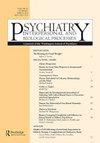《十四年后:从COVID-19全球大流行的视角看心理急救的五项原则》。
IF 2.7
4区 医学
Q2 PSYCHIATRY
Psychiatry-Interpersonal and Biological Processes
Pub Date : 2021-01-01
DOI:10.1080/00332747.2021.2005440
引用次数: 3
摘要
本文章由计算机程序翻译,如有差异,请以英文原文为准。
Fourteen Years Later: Hobfoll and Colleagues Five Principles of Psychological First Aid through the Lens of the COVID-19 Global Pandemic.
Fourteen years ago, Hobfoll and colleagues published a seminal article in the disaster psychiatry literature, “Five Essential Elements of Immediate and Mid-Term Mass Trauma Intervention: Empirical Evidence” (Hobfoll et al., 2007). This expert consensus’ five essential elements, which came to be known as the principles of Psychological First Aid (PFA) include promoting a sense of safety, calming, selfand community efficacy, connectedness, and hope. The elements of PFA were conceived at a time when the world was recovering from major disaster events including the 9–11 attacks, the South Asian tsunami of 2004, and Hurricane Katrina. Since its publication, the pace of disaster response has only increased. Mass shootings in Paris and Las Vegas, the Haiti and Great Japan Earthquakes, and the COVID-19 pandemic are extreme examples that illustrate the need for a coherent framework for disaster responders to approach the distress and illness that inevitably follow. As an evidence-informed framework of intervention, PFA has been a component of the disaster response to all these events. PFA frameworks are the standard of acute mental health intervention following disaster for the American and International Red Cross, the World Health Organization, and countless non-governmental and municipal organizations around the world. PFA has been
求助全文
通过发布文献求助,成功后即可免费获取论文全文。
去求助
来源期刊
CiteScore
2.70
自引率
0.00%
发文量
48
审稿时长
>12 weeks
期刊介绍:
Internationally recognized, Psychiatry has responded to rapid research advances in psychiatry, psychology, neuroscience, trauma, and psychopathology. Increasingly, studies in these areas are being placed in the context of human development across the lifespan, and the multiple systems that influence individual functioning. This journal provides broadly applicable and effective strategies for dealing with the major unsolved problems in the field.

 求助内容:
求助内容: 应助结果提醒方式:
应助结果提醒方式:


